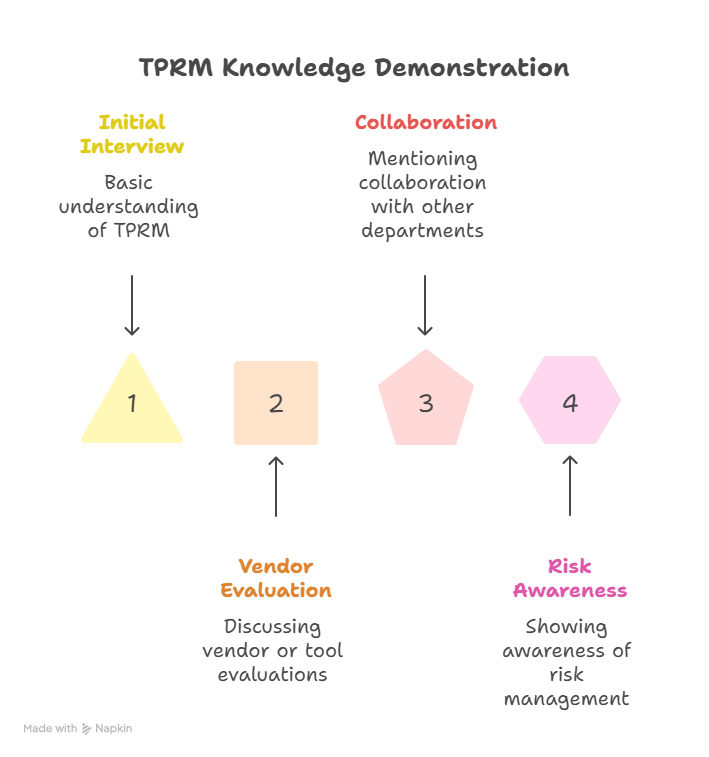In today’s corporate landscape, hiring managers are no longer looking for just technical skills or communication abilities — they’re searching for professionals who understand how the business operates securely and responsibly. As cyber threats increase and companies depend more on external partners, a new term has entered the corporate vocabulary: TPRM — Third-Party Risk Management.
For job seekers aiming to stand out in corporate interviews, understanding concepts like TPRM can be a game-changer. It shows that you not only grasp your role but also recognize the wider risks that can impact your company’s reputation, operations, and data security.
Table of Contents
ToggleWhat Is TPRM and Why Does It Matter in Corporate Roles?
In simple terms, Third-Party Risk Management (TPRM) is the process companies use to identify, assess, and mitigate the risks that come from working with external vendors, suppliers, or partners.
Every modern business relies on third parties — from software providers to marketing agencies, logistics firms, and even freelancers. Each of these partnerships creates potential vulnerabilities. A single weak link in a vendor’s system can expose sensitive company data, cause regulatory violations, or lead to public trust issues.
This is why organizations are now treating TPRM as an essential part of corporate governance. According to the Cybersecurity and Infrastructure Security Agency (CISA), supply chain and vendor-related attacks have become one of the fastest-growing cybersecurity threats worldwide.
Professionals who understand these dynamics bring extra value — they can help reduce organizational risk, contribute to compliance efforts, and align business operations with security priorities.
Why Job Seekers Should Care About Cybersecurity Awareness
You might be wondering, “I’m not applying for a cybersecurity position — why should I care about TPRM?” The answer is simple: cybersecurity is now everyone’s responsibility.
Whether you’re pursuing a role in HR, finance, operations, or marketing, you’ll likely be handling sensitive information or working with external tools and partners. Demonstrating cybersecurity awareness in your interview shows that you are proactive, careful, and business-minded.
For instance, when a candidate mentions how they evaluate tools or vendors for data privacy or compliance, it tells the interviewer that they think beyond their immediate duties. It’s the kind of mindset employers love — someone who helps protect the company as well as perform their role efficiently.
How to Highlight TPRM Knowledge During an Interview
Here are a few practical ways to bring TPRM into your interview conversation naturally, even if you’re not applying for an IT role:
- Discuss vendor or tool evaluations.
If you’ve ever participated in choosing a software platform, service provider, or marketing partner, explain how you considered security, compliance, or data protection in that process. - Mention collaboration with other departments.
Say you’ve worked with legal or IT teams to ensure third-party compliance — that experience directly connects to TPRM principles. - Show awareness of risk management.
You can mention how you helped minimize operational or reputational risk in previous roles — even if indirectly. - Ask smart questions.
At the end of the interview, ask, “How does the company manage vendor risks or cybersecurity across departments?” It signals curiosity and awareness of modern corporate challenges.

The Hidden Connection Between TPRM and Career Growth
Companies are under increasing pressure to maintain high security standards. Data protection regulations such as GDPR, HIPAA, and ISO frameworks require organizations to carefully vet third-party vendors. That means employers value staff who understand compliance, data privacy, and vendor accountability.
Knowledge of TPRM can therefore fast-track your career. Roles like project manager, procurement specialist, risk analyst, or even marketing managers all benefit from understanding how third-party risks work.
It also opens opportunities for advancement — professionals who can bridge communication between technical and non-technical teams are in high demand. If you can explain security and compliance concepts in plain language, you become a trusted advisor within the organization.
How to Learn More About TPRM and Cyber Risk
If you’re new to the topic, start by exploring foundational resources such as:
- The CISA Cybersecurity Best Practices guide — for understanding how organizations approach risk management and vendor oversight.
- Online TPRM and cybersecurity awareness courses (many are free).
- Company blogs and training materials that discuss vendor risk, compliance, and security posture.
You don’t need to become an expert overnight. Even a basic understanding of how organizations safeguard their data and vendor relationships can help you answer questions more confidently and strategically.
Sample Interview Talking Points
Here are examples of how you could integrate your cybersecurity awareness into interview answers:
“In my previous role, we worked with several digital service providers. I always ensured that we used tools that met our company’s security standards and complied with GDPR — it taught me a lot about third-party risk management.”
Or:
“I’ve been learning about TPRM and how companies protect themselves from vendor vulnerabilities. I think understanding those principles is crucial for keeping operations secure and compliant.”
These statements show not only initiative but also awareness of real-world business risks — two qualities that corporate recruiters consistently value.
Final Thoughts
In competitive corporate hiring environments, the best candidates go beyond the job description. They demonstrate curiosity, adaptability, and awareness of emerging business priorities — including cybersecurity.
Understanding TPRM (Third-Party Risk Management) can set you apart as a forward-thinking candidate who understands both operational and digital risks. Even if you’re not in a security role, being able to talk intelligently about vendor risk, compliance, and data protection can make a powerful impression.
In short, strong candidates manage more than their tasks — they help protect the organization itself.
FAQs
1. What is TPRM and why is it important in corporate environments?
TPRM stands for Third-Party Risk Management. It’s the process of identifying, assessing, and mitigating risks associated with external vendors and partners. In today’s interconnected business world, TPRM is vital for ensuring data security, compliance, and operational resilience.
2. How does knowledge of TPRM help during a corporate job interview?
Understanding TPRM shows that you’re aware of organisational risks and value governance and compliance. It signals to employers that you think strategically and can contribute to building a secure, compliant business ecosystem.
3. Do I need technical skills to understand TPRM?
Not necessarily. While technical knowledge helps, TPRM also involves policy understanding, risk assessment, communication, and vendor relationship management — all of which are important for non-technical roles too.
4. Which industries value TPRM knowledge the most?
Sectors such as banking, finance, IT, healthcare, and manufacturing rely heavily on vendors and therefore prioritise candidates with TPRM awareness. These industries face strict regulatory and data security requirements.
5. How can I start learning about TPRM before an interview?
You can start with online courses, compliance blogs, and frameworks like ISO 27001 or NIST. Understanding how organisations assess and monitor vendor risks will help you confidently discuss TPRM in interviews. There are many companies that are giving corporate training on cybersecurity and covering TPRM.





